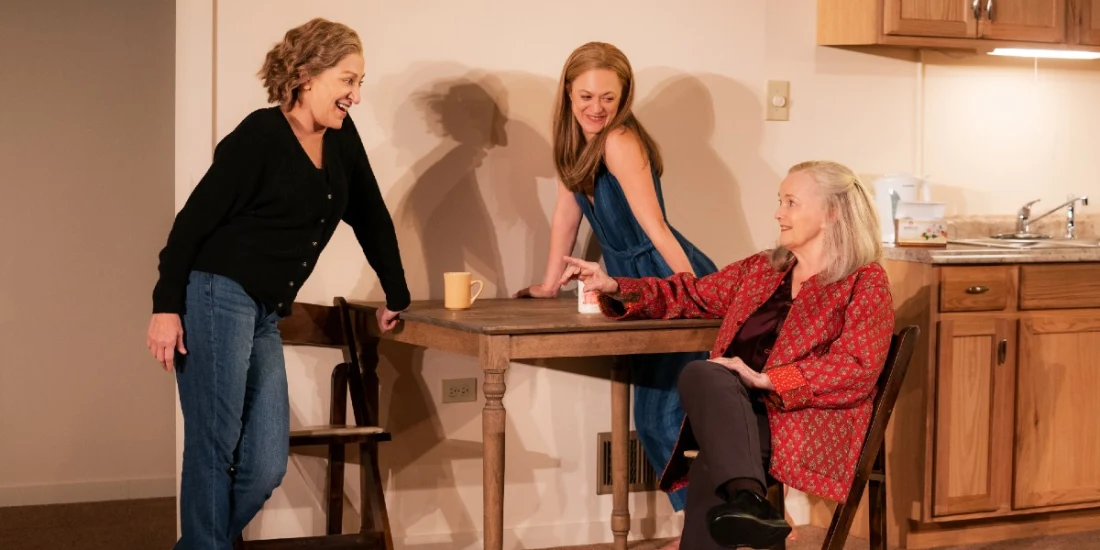'Morning Sun' review — Edie Falco leads a trio of astounding actors in Simon Stephens's uneven play
In one crucial moment of Morning Sun, the new play by Simon Stephens, the main character, Charley, is about to have an abortion. As she's heading to her appointment, one of the characters in the play says, "Something at that precise moment makes you stop. And think. And turn around. And go back to work." Charley decides not to have an abortion. But what the play does not tell you is what exactly made Charley decide to change her life. It's only an amorphous "something." And this lack of specificity is what makes Morning Sun a well-acted, but ultimately unsatisfying play.
In Morning Sun, Edie Falco (of The Sopranos and Nurse Jackie fame) plays Charlotte (nicknamed Charley) who, on her deathbed, looks back on her life in New York City. She sees two apparitions (played by Tony winner Blair Brown and Tony nominee Marin Ireland), and they play Charley's mother and Charley's daughter as well as the figures that go in and out of Charley's life.
The play is ingeniously directed by Lila Neugebauer, known for directing off-kilter work with stunning clarity and surgical precision. Through economically moving the actors from one part of the apartment set to the other, Neugebauer is able to keep the different characters and moments in time clear, while keeping up the energy of the play.
Brown and Ireland switch from character to character just with a step, or with a deepening of their voices. Ireland is particularly chameleonic in her ability to play not just Charley's loving daughter, but also Charley's abusive boyfriend and bitter father — she disappears into each role in her body language and voice; it's truly an acting masterclass.
Brown is alternatingly warm and biting as Charley's mother Claudette. She plays off Falco's more subdued energy wonderfully, giving that relationship an understandable friction.
Falco has a different challenge. She has to play Charley in different stages of her life. This is where the script fails to support the astounding actors in the show. Falco is able to imbue Charley with a listlessness and sadness, giving that character depth and humanity through her face and body language. Unfortunately, the script doesn't give Charley a similar humanity: What are her motivations? What are her goals? Why does she rarely ever leave New York City? Why did she make that decision?
Instead, it is up to Falco, through her performance, to provide some kind of subtextual answer. But when the audience is spending 90 minutes with a character, we need something more substantial for the why behind Charley than, as the play says, "the sunshine that morning." A metaphor without substance is just empty words.
Instead of being an active character, Charley is a passive one, reacting to the things that happen to her without any insight into how those things affect her personality and affect her actions. There's also a tasteless reference to 9/11, which seemed like it was placed in there to give the latter half of the play some dramatic weight and elicit an emotional reaction from the audience.
It's not to say that plays need to have large, seismic conflicts with larger-than-life characters in order to be interesting. But what they do need to have is some kind of dramatic tension that propels them. Morning Sun hints at some threads, such as Charley's fraught relationship with her parents, her bouts of alcoholism, her codependent relationship with her daughter, and her increasing disillusionment with New York City, all of which are brought up in a quick exchange before being discarded. If they don't seem to affect Charley that deeply, why should the audience care?
The most electric moment in the play is an argument between Charley and Claudette, when they argue about how Charley raised her daughter. "As a mother, you're a failure. You let her drift and now what she is, Charlotte, is mediocre," says Claudette. The emotional specificity in that exchange then raises questions about motherhood and about what it is to exist as an ordinary person. The play would have benefited from more of that specificity.
It's understandable that Morning Sun wants to focus on a regular person, an everywoman, trying to stumble their way through life (though it's debatable whether a relatively privileged middle-class white woman who inherited a West Village apartment from her parents can be defined as an everywoman).
But at the end of Morning Sun, after spending 90 minutes with Charley, it's unclear if we really truly know her.
Morning Sun is running through December 19 at New York City Center.
Photo credit: From left to right, Edie Falco, Marin Ireland, and Blair Brown in Morning Sun. (Photo by Matthew Murphy)
Originally published on
